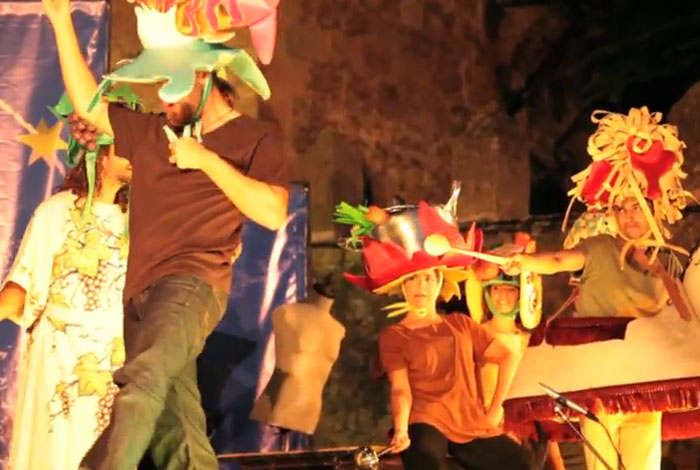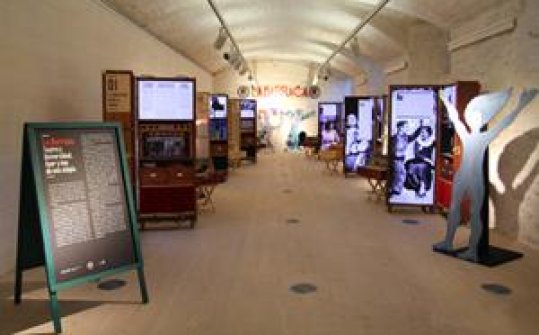7th Centenary of the Scola Studiorum in Palencia
- Route 1. Galicia, Madrid, Castilla-La Mancha, Asturias, Castilla y León, Cantabria y Navarra. El bobo del colegio (The School Dunce), by Lope de Vega. Aula de Teatro de Antropología de la Universidad de Sevilla e In Vitro Teatro de la Universidad de Jaén
- Route 2. Castilla y León, Madrid, Galicia, Castilla-La Mancha, Aragón, Navarra y La Rioja. Lorca, Calderón y los estudiantes de Babe (Lorca, Calderón and the Students of Babel), based on Calderón de la Barca's one-act comedies, texts by Lorca and European songs. Escena Erasmus-Universidad de Valencia.
- Route 3. Madrid, Castilla y León, Navarra, Asturias, Cantabria, Castilla-La Mancha y Extremadura. Obligados y ofendidos (Obliged and Offended), by Francisco de Rojas Zorrilla. Aula de Teatro de Arquitectura de la Universidad Politécnica de Madrid.
Bicentenary of the Constitution of Cadiz
- Route 4. Andalucía, Murcia, Valencia, Castilla y León, Cantabria, Aragón y Castilla-La Mancha. Aquel Fernando (That Fernando) by Jerónimo López Mozo. Aula de Teatro de la Universidad de Alicante.
- Route 5. Andalucía, Extremadura, Castilla-La Mancha, Madrid, Cantabria y Aragón. El teatro de la patria o la patria del teatro (The Theatre of the Motherland or the Motherland of the Theatre) by Marco Antonio de la Parra . La luz interna. Escuela de Teatro de la Facultad de Filosofía y Letras de la Universidad Autónoma Nuevo León, México.
- Route 6. Andalucía, Valencia, Castilla-La Mancha, Castilla y León y Aragón. Luz en tinieblas (Light in Shadows), by Laila Ripoll. Aula de teatro de la Universidad de Murcia.
Calendar
In the footsteps of La Barraca, organised by Acción Cultural Española (AC/E), will in 2012 be commemorating the 7th Centenary of the Scola Studiorum in Palencia and the Bicentenary of the Constitution of Cadiz . In the seventh edition of this theatre project, AC/E is combining the standard repertoire of classic works with contemporary authors, with the aim that the commemoration of the 1812 Constitution should reach towns and villages throughout the country with a modern-day perspective. As a result, the three works marking the Bicentenary of La Pepa, as the 1812 Constitution is popularly known, Aquel Fernando (That Fernando), El teatro de la patria o la patria del teatro (The Theatre of the Motherland or the Motherland of the Theatre), and Luz en tinieblas (Light in Shadows))have been written especially for the occasion by Jerónimo López Mozo (Gerona, 1942), Marco Antonio de La Parra (Santiago de Chile, 1952) and Laila Ripoll (Madrid, 1964), respectively.
For the 7th Centenary of the Scola Studiorum in Palencia, the chosen works are Lorca, Calderón y los estudiantes de Babel (Lorca, Calderón and the Students of Babel), based on Calderón de la Barca's one-act comedies, texts by Lorca and European songs; El bobo del colegio (The School Dunce), by Lope de Vega; and Obligados y ofendidos (Obliged and Offended), by Francisco de Rojas Zorrilla.
The six groups of amateur dramatists (five from Spain: Alicante, Madrid, Murcia, Valencia and Jaén-Seville, and one from Latin America: Mexico City) involved in the programme this year were selected from among the 30 submissions which the AC/E received. A jury, chaired by César Oliva (Professor of Spanish Literature at the University of Murcia, and Project Director of Las Huellas de La Barraca) and comprising Ricardo Beléndez, Manuel Canseco, Laura García Lorca, Guillermo Heras, Jerónimo López Mozo, Natalia Menéndez, Laila Ripoll and Germán Vega, selected these six works performed by theatre groups from the universities of Alicante, Murcia, Valencia, Seville and Jaén (in collaboration), Madrid Technical University and the Autonomous University of Mexico.
The works will be performed during July and August, divided into six routes or tours covering more than 200 towns and cities across 13 Spanish regions (Andalusia, Aragon, Asturias, Cantabria, Castile-La Mancha, Castile-Leon, Extremadura, Galicia, La Rioja, Madrid, Murcia, Navarre and Valencia). Alongside these performances, some of the works will also be featured at the theatre festivals of Alcalá, Almagro, Olite, Pedroches and Vins, as well as the Santander International Festival.
The funding structure behind the project is based on three sources: AC/E, the selected university theatre companies and the local institutions they will be visiting. AC/E has provided a grant for the production of the works, an expense allowance for the members of the university groups, and is also covering the costs of travel, transportation, posters and advertising for the project. Each university is providing the set and props for their productions, in accordance at all times with the principles of mobility introduced by La Barraca. Local authorities are covering the costs of food, accommodation and preparation of both open-air and enclosed venues. This enables the project to maintain another of the distinctive features of La Barraca, namely performing free of charge.
Seven years with La Barraca
With the support of Acción Cultural Española, César Oliva's concept of Las Huellas de La Barraca was created with the aim of restoring the modest venture undertaken by Federico García Lorca in the 1930s, travelling to numerous villages across Spain with a group of student actors to put on free theatre performances.
Over the last six years the project has involved 17 schools of dramatic art and theatre courses from the following universities: Alcalá, Alicante, Barcelona, Madrid's Carlos III, Del Valle (Colombia), Granada, Jaén, Murcia, Santiago de Compostela, Ourense, Valencia, Mexico, Santiago de Chile and Puerto Rico, along with the Higher School of Dramatic Art of Castile-Leon and the José Estruch Foundation-Royal Higher School of Dramatic Art. Six years of intense efforts during which performances have been given in a more than 600 Spanish towns and prisons of works by authors including Cervantes, Lope de Vega, Tirso de Molina, Rojas Zorrilla, Alejandro Casona, Federico García Lorca, Benito Pérez Galdós, Rafael Alberti, Félix Enciso, José Ignacio González, Azorín, Inés Stranger Rodríguez, Miguel-Anxo Murado, Ramón María Valle-Inclán, Jacinto Alonso Maluenda and Josep de Valdivieso.
Over the years, Las Huellas de La Barraca has marked the 75th anniversary of the proclamation of the 2nd Republic (2006); the 4th centenary of Rojas Zorrilla (2007); the Peninsular War (2008); the publication of Arte Nuevo de Hacer Comedias (New Art of Comedy), by Lope de Vega (2009); the Xacobeo pilgrimage year (2010) and, to commemorate the first performance in 1932 of La Vida es Sueño (Life is a Dream), by Calderón de la Barca, in the Cloister of San Bernardo in Madrid, performed by Federico García Lorca and his actors in La Barraca en la Universidad (La Barraca at the University) (2011).
La Barraca was the landmark venture undertaken during the 2nd Republic by the Minister of Public Instruction, Fernando de los Ríos, under the influence of Federico García Lorca, like him a native of Granada. It was also the project of which he felt proudest, in that it served to restore an interest among the Spanish public in the theatre of the Golden Age. On 10 July 1932 a group of university students, instructed by the Granada-born poet, set up a stage in the central town square of Burgo de Osma, in the province of Soria, the venue for the first performance of Calderón's La Vida es Sueño, with a set design by Benjamín Palencia. Federico himself played the role of The Shadow. Following on from that performance, La Barraca covered much of Castile, Galicia, Cantabria, La Rioja… and over the course of five years had visited practically every corner of the country.
2010 Dionysus Awards
In 2010 Las Huellas de La Barraca received the Dionysus award granted by the UNESCO and the Madrid Region to honour theatre projects with a social impact. The fundamental reasons cited by the members of the jury in bestowing the award, in its fourth year, on the project were its support for the university theatre movement, the altruism of the student actors, the generation of a new theatre audience and the development of theatre as a cultural asset in those regions which, because of their geographical position, have no deep-rooted tradition of the scenic arts.

















